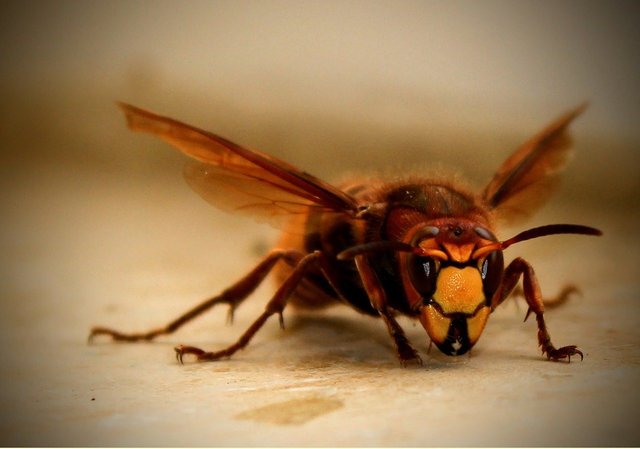
//Summer Threat//
Spring and summer on the horizon and the weather will be turning up the heat in the coming months. With the change in season, there comes sunshine, pollen and the arrival of certain insects. While it’s supposed to be a buzzing time shared with friends and family, we might be indoors self-isolating for a little while longer. Butterflies, busy bees and other flying insects may enjoy a more peaceful few weeks out in the open as the human race takes some time off. Over the last few years however, a new predator has arrived on western regions to pose a threat. The Asian giant hornet.
//An Enemy of Bees//
If you have never met an Asian hornet before, you will know when it’s nearby. They’re loud and can be aggressive to not only other insects but humans too. They are fierce and resilient, surviving for almost a decade with a growing population. Hornets arrived in Europe from china by accident and while they are a danger to humans, potentially causing death, the main problem lies in their predatory nature towards our honey bees. I love me some honey and an attack on a busy bee is a big problem that scientists have been closely monitoring and looking to resolve. Hornets are unforgiving and will decapitate bees, bringing them back to a nest. It’s gruesome, and scary due to the bees not being equipped with any defense mechanisms against the foreign invader. As our faithful bee workforce goes under attack, scientists sought out a way to deal with the growing invasion from the Asian Hornet.
//A Buzz Trap//
Far from a honey trap, scientists have figured out how to communicate and manipulate hornets through pheromone release. Using a trap, hornets are coerced into a trap where they meet their demise. While it’s a progressive step to combating the hornet problem, not much is known about the Asian hornet and how to deal with its growing numbers without damaging the population of other insects at the same time. I might even relate this type of hostile invasion and defense to certain events online recently. Bees contribute greatly to our economy and hornets are on the unknown side. It’s great to see science try a ‘Dolittle’ approach but there’s much to be understood before an appropriate solution of population control is developed. Perhaps with other things going on in the world, an epidemic for instance, the hornets will be left to grow for just a little while longer.
Sources
https://www.connexionfrance.com/French-news/French-scientists-fight-Asian-hornet-in-its-own-language-in-new-Manche-research-project
https://www.newscientist.com/article/mg24532740-800-wasps-may-benefit-us-as-much-as-bees-could-we-learn-to-love-them/
Congratulations! Your post has been selected as a daily Steemit truffle! It is listed on rank 12 of all contributions awarded today. You can find the TOP DAILY TRUFFLE PICKS HERE.
I upvoted your contribution because to my mind your post is at least 2 SBD worth and should receive 66 votes. It's now up to the lovely Steemit community to make this come true.
I am
TrufflePig, an Artificial Intelligence Bot that helps minnows and content curators using Machine Learning. If you are curious how I select content, you can find an explanation here!Have a nice day and sincerely yours,

TrufflePigDownvoting a post can decrease pending rewards and make it less visible. Common reasons:
Submit